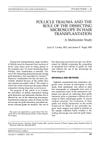 44 citations,
December 1991 in “Annals of the New York Academy of Sciences”
44 citations,
December 1991 in “Annals of the New York Academy of Sciences” EGF and FGF help hair growth by affecting cell differentiation and fiber growth.
[object Object]  42 citations,
July 2017 in “Scientific Reports”
42 citations,
July 2017 in “Scientific Reports” Women with PCOS are more likely to have insulin resistance and obesity, especially those with the most severe type I PCOS.
 35 citations,
May 1986 in “Clinics in endocrinology and metabolism”
35 citations,
May 1986 in “Clinics in endocrinology and metabolism” The exact cause of increased 5α-reductase activity leading to hirsutism in women is still unknown.
 27 citations,
September 1999 in “Journal of Investigative Dermatology”
27 citations,
September 1999 in “Journal of Investigative Dermatology” Human skin cells contain Protease Nexin-1, and male hormones can decrease its levels, potentially affecting hair growth.
 23 citations,
December 2004 in “Differentiation”
23 citations,
December 2004 in “Differentiation” Sex hormones affect hair and feather growth and may help manage alopecia and hormone-dependent cancers.
 21 citations,
August 2014 in “Gynecological Endocrinology”
21 citations,
August 2014 in “Gynecological Endocrinology” Higher hs-CRP levels in Indian adolescent women with PCOS are more related to BMI than PCOS itself.
 9 citations,
February 1996 in “Lancet”
9 citations,
February 1996 in “Lancet” Some tuberculosis drugs may cause hair loss, but hair might regrow after treatment or changing the drugs.
[object Object]  8 citations,
April 1999 in “Dermatologic Clinics”
8 citations,
April 1999 in “Dermatologic Clinics” Using microscopes in hair transplants reduces follicle damage.
 7 citations,
January 2021 in “The journal of gene medicine”
7 citations,
January 2021 in “The journal of gene medicine” Certain genetic differences may affect how likely someone is to get COVID-19 and how severe it might be.
 6 citations,
January 2007 in “Journal of the European Academy of Dermatology and Venereology”
6 citations,
January 2007 in “Journal of the European Academy of Dermatology and Venereology” Mercury allergy linked to specific genes may contribute to burning mouth syndrome, and silicon might play a role in maintaining healthy hair.










